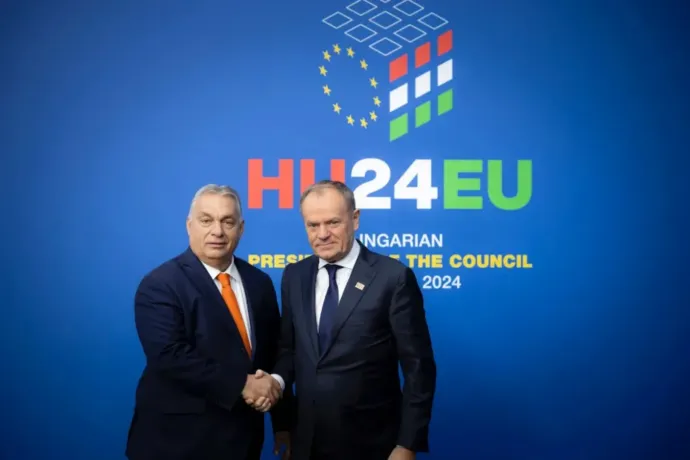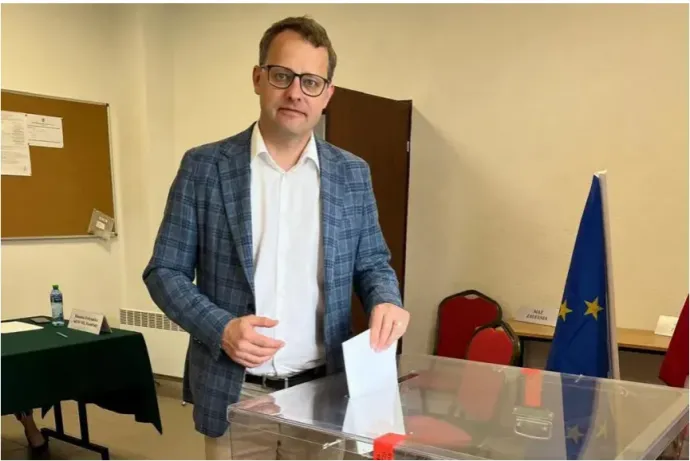Romanowski's asylum takes Hungarian-Polish relations from bad to worse

The Polish Foreign Ministry summoned Hungary's ambassador to Warsaw on Friday to present a formal letter of protest against the granting of political asylum to Polish politician Marcin Romanowski, the Polish Foreign Ministry announced on Friday morning. At the same time, the Polish Foreign Minister ordered their ambassador to Budapest home for consultations.
We reported on Thursday that, according to information confirmed by several independent sources, Viktor Orbán said in a speech at a private event on 10 December that a Polish citizen would soon be granted political asylum in Hungary.
Although Orbán did not mention a name, it was presumed to be the opposition politician Marcin Romanowski, who is suspected of corruption offences. We sent a question about this to the Hungarian government early Thursday morning but received no reply. However, in the afternoon, Minister Gergely Gulyás confirmed to a Hungarian government friendly portal that Romanowski had indeed applied for and received asylum.
On Thursday, the news turned into a huge political scandal in Poland, and Polish-Hungarian relations became even more strained than before.
In a statement on Friday, the Polish Foreign Ministry sharply criticised the Orbán government's decision, saying that Romanowski is under a European arrest warrant. According to the Polish ministry, the measure is "a hostile step towards the Republic of Poland and runs counter to the fundamental principles of cooperation between EU member states".
The statement further stresses that the move is contrary to the principle of loyal cooperation enshrined in paragraph 3 of Article 4 of the Treaty of the European Union.
According to the Foreign Ministry, the "invocation of the right to asylum on the grounds of alleged political persecution is offensive both to Polish citizens and to the Polish authorities."
Poland also lodged a formal protest, which was handed over to the Hungarian ambassador in Warsaw on Friday, who was formally summoned to the Polish Foreign Ministry. In addition, Poland's ambassador to Hungary, Sebastian Kęciek, has also been called home for consultations. In diplomacy, both gestures are a strong signal of indignation.
According to a statement of the Polish Foreign Ministry, no EU Member State is exempt from the obligation to execute a European Arrest Warrant. "This is a decision that can only be taken by an independent and impartial court and has a legal, not a political, dimension," it said. If Hungary fails to comply with its European obligations, Poland will initiate proceedings against Hungary by the European Commission under Article 259 of the Treaty on the Functioning of the European Union.
What does an international lawyer say?
"It is not unprecedented for someone to feel that he or she is subject to political persecution in an EU state and to therefore apply for political asylum in another state," international lawyer Tamás Hoffmann told Telex, citing the example of Hungarians who have already applied for and been granted political asylum in Canada and the United States. At the same time, Hoffmann said that viewing the Romanowski case and its context from the outside, does not seem to substantiate that the politician concerned would indeed be subject to persecution in Poland.
According to him, the mere fact that Romanowski was detained in Poland while he still had immunity is not a strong argument, given that he was released the day after and an arrest warrant was only issued for him later, once he had been stripped of his immunity.
In this case, Hoffmann said, the Hungarian state should somehow prove why it assumes that Romanowski is politically persecuted. This would presuppose that the Hungarian state believes that the charges against the politician are unfounded and false and that the proceedings against him are aimed only at his imprisonment. Moreover, it is extremely rare that there is only one person in a country who is persecuted for his political views.
The application for refugee status is assessed on an individual basis. The applicant must provide some evidence to substantiate his or her fear of political persecution in their own country. In principle, the government does not and cannot intervene in such a procedure, which is carried out by the Immigration Office.
However, it is clear that Romanowski's case is not the same as an ordinary case. Usually, asylum seekers do not apply for asylum in Hungary, but at the embassy of a neighbouring country.
Of course, there can be and are exceptions, for example, that of the North Macedonian politician Nikola Gruevski, who is also accused of crimes, and who was "smuggled" into Hungary by car with the help of the Hungarian state, where he was then granted political asylum. It is not known where Romanowski submitted his application or how quickly it was processed, but Hoffmann said it was clear that his case was outside the normal administrative procedure.
What are the charges against Romanowski?
Marcin Romanowski, the former Deputy Head of the Polish Ministry of Justice, is accused of several serious crimes. According to the Polish National Prosecutor's Office
the politician is accused of 11 criminal offences, among them participation in an organised criminal group and misuse of public funds.
The allegations include Romanowski using his political position to name tender winners who were to receive grants from the Justice Fund. The politician allegedly gave instructions on how to correct faulty applications retrospectively and approved grants for organisations that did not meet formal and content requirements.

According to the prosecutor's office, Romanowski misused more than 107 million PLN (€ 25 million) of public money and attempted to embezzle another 58 million PLN (€ 13.5 million). In July, the Polish parliament lifted the politician's immunity and approved his detention. A European arrest warrant has since been issued for him, but Hungary granted him political asylum on 19 December.
Orbán preferred to avoid the issue when confronted by journalists
On Thursday, on his way out of the European Council summit, Orbán was reluctant to comment on the case, saying only that "there is a legal process underway" in which he claimed he had no role. He also said that relations with the Poles were not good. Orbán said that the Polish justice minister had "brutally attacked" the Hungarian government in a statement to Politico on Wednesday, when he said that, judging by the example of Poland, it would be difficult for Hungary to return to the rule of law without a change of government.
The Hungarian Prime Minister is fully under the influence of Jarosław Kaczyński in his interpretation of events in Poland, his old rival Donald Tusk told Polish journalists in Brussels. He said Orbán had confirmed the Hungarian government's intentions to him. "I told him that in case the decision taken in Budapest would be contrary to European rights on political asylum or would not respect the European Arrest Warrant, which is in force in all EU member states, I would not be the one in a precarious position, but him."
The main fault lines in Hungarian-Polish relations
The deterioration of Hungarian-Polish relations has been mainly due to different geopolitical and ideological strategies and differences in the handling of EU affairs, and the Romanowski affair has only aggravated the situation. While the two countries used to act as close allies in the EU, they are now increasingly distancing themselves from each other, which could have serious long-term implications for political cooperation in Central Europe.
The tension between the two countries stems in part from their diverging views on the war between Russia and Ukraine. Poland has been a strong supporter of Ukraine, has provided substantial military and humanitarian aid to Kyiv, and has been frequently critical of Russia. Hungary, on the other hand, is more pro-Russian, more permissive but more critical of Ukraine. Orbán's reluctance to support the EU's sanctions policy against Russia has not gone down well with the Poles either.
In recent years, both Hungary and Poland have been in conflict with the EU over rule of law issues, but their approaches to the dispute and their goals have diverged over time. The new Polish government is seeking to settle the conflicts with Brussels and has tried to engage in a more constructive dialogue. Hungary, on the other hand, continues to take a tougher stance towards the EU, in particular on the rule of law mechanism and the withholding of EU funds.
Although both countries are led by conservative governments, ideological differences are becoming increasingly clear. The Polish government has recently sought to emphasise respect for democratic norms and has tried to move closer to the EU's core values – in contrast to the Orbán government, which continues to "fight" against Brussels. Poland, meanwhile, is increasingly distancing itself from the Hungarian government's controversial practices regarding EU funds.
For more quick, accurate and impartial news from and about Hungary, subscribe to the Telex English newsletter!